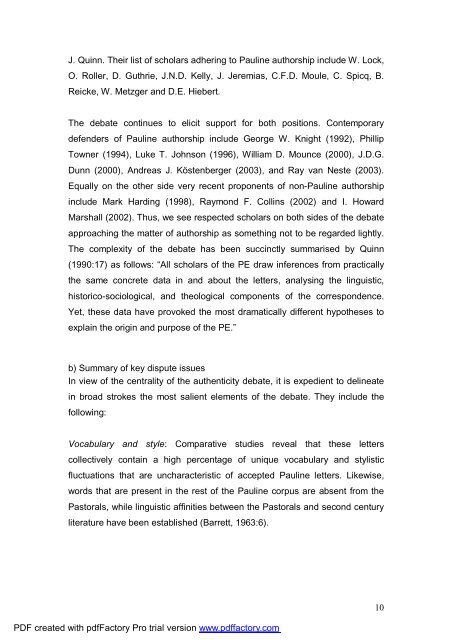A Text centred rhetorical analysis of Paul's Letter to Titus
A Text centred rhetorical analysis of Paul's Letter to Titus
A Text centred rhetorical analysis of Paul's Letter to Titus
You also want an ePaper? Increase the reach of your titles
YUMPU automatically turns print PDFs into web optimized ePapers that Google loves.
J. Quinn. Their list <strong>of</strong> scholars adhering <strong>to</strong> Pauline authorship include W. Lock,<br />
O. Roller, D. Guthrie, J.N.D. Kelly, J. Jeremias, C.F.D. Moule, C. Spicq, B.<br />
Reicke, W. Metzger and D.E. Hiebert.<br />
The debate continues <strong>to</strong> elicit support for both positions. Contemporary<br />
defenders <strong>of</strong> Pauline authorship include George W. Knight (1992), Phillip<br />
Towner (1994), Luke T. Johnson (1996), William D. Mounce (2000), J.D.G.<br />
Dunn (2000), Andreas J. Köstenberger (2003), and Ray van Neste (2003).<br />
Equally on the other side very recent proponents <strong>of</strong> non-Pauline authorship<br />
include Mark Harding (1998), Raymond F. Collins (2002) and I. Howard<br />
Marshall (2002). Thus, we see respected scholars on both sides <strong>of</strong> the debate<br />
approaching the matter <strong>of</strong> authorship as something not <strong>to</strong> be regarded lightly.<br />
The complexity <strong>of</strong> the debate has been succinctly summarised by Quinn<br />
(1990:17) as follows: “All scholars <strong>of</strong> the PE draw inferences from practically<br />
the same concrete data in and about the letters, analysing the linguistic,<br />
his<strong>to</strong>rico-sociological, and theological components <strong>of</strong> the correspondence.<br />
Yet, these data have provoked the most dramatically different hypotheses <strong>to</strong><br />
explain the origin and purpose <strong>of</strong> the PE.”<br />
b) Summary <strong>of</strong> key dispute issues<br />
In view <strong>of</strong> the centrality <strong>of</strong> the authenticity debate, it is expedient <strong>to</strong> delineate<br />
in broad strokes the most salient elements <strong>of</strong> the debate. They include the<br />
following:<br />
Vocabulary and style: Comparative studies reveal that these letters<br />
collectively contain a high percentage <strong>of</strong> unique vocabulary and stylistic<br />
fluctuations that are uncharacteristic <strong>of</strong> accepted Pauline letters. Likewise,<br />
words that are present in the rest <strong>of</strong> the Pauline corpus are absent from the<br />
Pas<strong>to</strong>rals, while linguistic affinities between the Pas<strong>to</strong>rals and second century<br />
literature have been established (Barrett, 1963:6).<br />
PDF created with pdfFac<strong>to</strong>ry Pro trial version www.pdffac<strong>to</strong>ry.com<br />
10

















